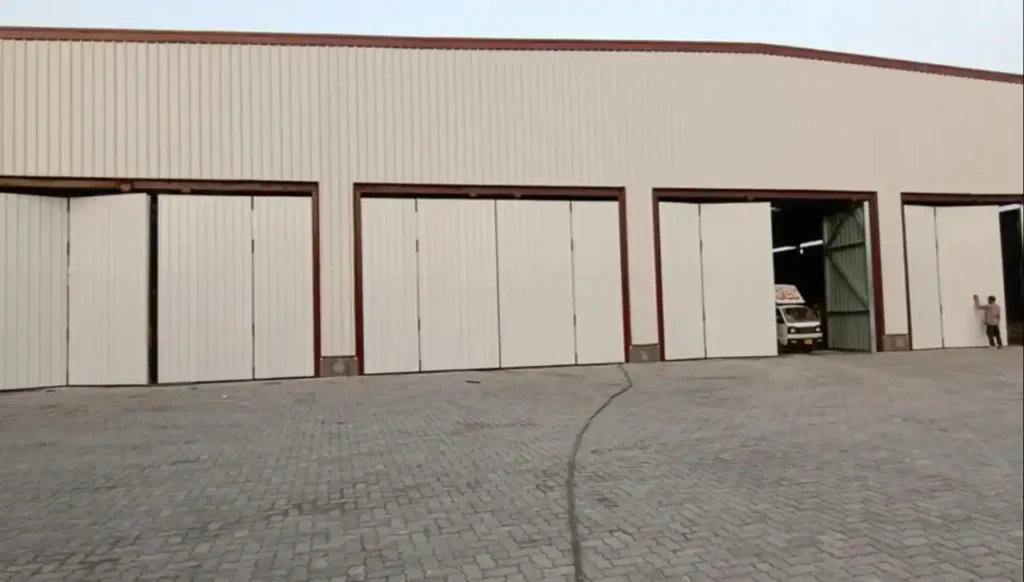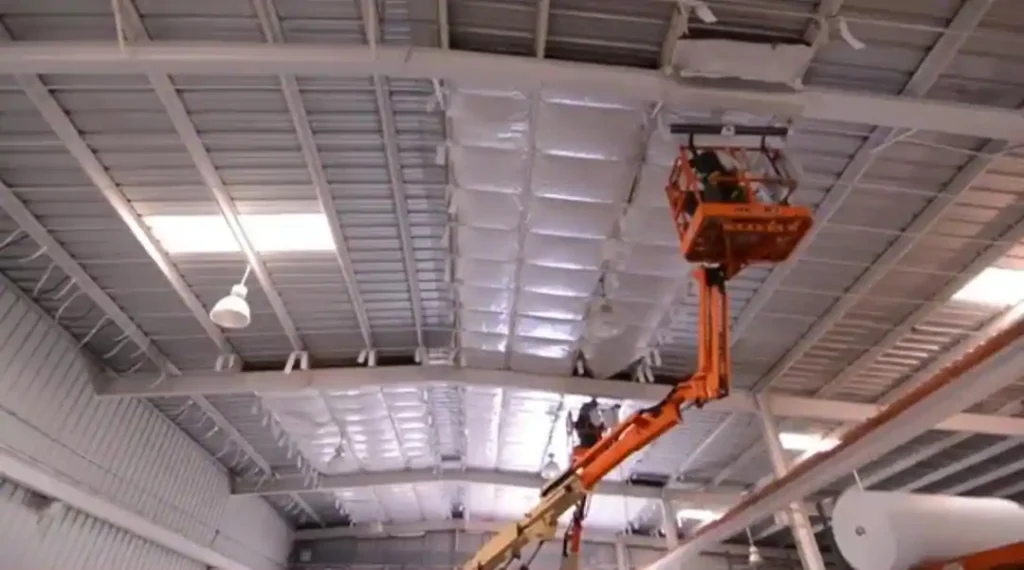Warehouse insulation is as important as a barndonium home or any type of garage. As we all know the importance of warehouses is increasing. Nowadays along with garages, warehouses also belong to an important part of the home. Warehousing plays a vital role in storing products or goods to distribute or sell.
Mostly, in the United States, the construction of warehousing is growing rapidly. Nowadays warehouse is commonly constructed. We see the garage insulation in a hot climate in our previous post and now in this post, we focus on Warehouse Insulation.
In this post, we will get to know things about, why the warehouse needed insulation, types of suitable warehouse insulation, and the best way to insulate the warehouse. So, let’s clear the above points one by one in this post, you must read the post.
The warehouse is known as a commercial building in large spaces or sheds for storing a large number of products, whereas there are some small or home-based businesses that use an extra big hall, room basement, or garage as a storehouse, but mostly big warehouses constructed for logistics management of inventory and distribution.
Any structure used for manufacturing, storage, or distribution should have adequate warehouse insulation. Insulation aids in maintaining the warehouse’s constant temperature, which is essential for the security of the products being stored inside and the comfort of workers. There are several types of warehouse insulation material available in the market, including spray foam insulation. You need to insulate all parts of the warehouse like roof insulation, door insulation, and wall insulation, which will be covered in this piece.
Importance of insulation to warehouse

As other types of properties such as home, office, and garage warehouses also need insulation because the insulation in the warehouse helps to prevent heat transfer and moisture barrier and helps to maintain desirable interior conditions as we all know warehouses mostly use to store the things like food items, and automobiles.
- To preserve stored goods
- To save the cost of heating or cooling
- To Enhance HVAC System Performance
- To reduce emission
- To reduce unwanted noise
- To protect against moisture problem
- To protect from rodent
Warehouse Wall Insulation

Wall insulation in warehouses is most important. The internal temperature of a warehouse is crucially maintained by the walls of the structure. Installing wall insulation can aid in reducing heat gain during the summer and preventing heat loss during the colder months, you may read the post warehouse wall insulation, in that we shared the benefits of wall insulation. Fibreglass batts and blown-in cellulose insulation are the two most popular wall insulation materials used in warehouses.
An inexpensive option for warehouse wall insulation is fiberglass batts. They come in pre-cut panels that are simple to place in between the wall studs and are constructed of woven glass fibers. On the other hand, blown-in cellulose insulation needs to be blown into the wall cavities and is comprised of recycled paper.
Warehouse Roof Insulation

Another crucial element of a warehouse where insulation is required is the roof of the warehouse. Because heat rises, a significant amount of heat can escape through the roof if there is inadequate insulation. You may read the post, Warehouse roof insulation. Insulating the roof of the warehouse may lead to higher energy expenses and less comfortable working conditions for staff. Rigid foam insulation and sprayed polyurethane foam (SPF) insulation are the two most typical types of roof insulation used in warehouses.
A strong and lightweight solution for warehouse roof insulation is rigid foam insulation. It is offered in a range of thicknesses and is simple to cut to the specifications of the roof. On the other side, SPF insulation is more expensive but offers better insulating performance. It is sprayed straight onto the roof deck, where it spreads out to fill any openings.
Warehouse Door Insulation
In order to avoid heat loss and air infiltration, warehouse doors should be insulated as they are a crucial component of the building’s thermal envelope. You may also read the post, Warehouse door insulation, in which we shared the benefits of insulated doors. Foam core doors, insulated metal doors, and weatherstripping are just a few of the different types of door insulation that are offered.
Foam core doors have a strong foam core and function very well as insulators. On the other hand, insulated metal doors have two metal skins with an insulating layer sandwiched between them. Another crucial element of door insulation is weatherstripping, which can be used to close cracks around the door frame and between the door and the floor.
warehouse insulation types
The following are the best insulation material mostly used to insulate the warehouse, you should select one of them according to your budget, need, area, and size of a warehouse. There is another thing has to need to consider before starting and selecting the insulation type and material, and that is the r-value of that material. You know the importance of the r value and how it measures and works.
You must select the best-valued insulation material to insulate the warehouse because it has the ability to block the flow of heat. Following are some insulation types best for warehouses
Sprayfoam Warehouse
Spray foam insulation is the best option to insulate the warehouse because it’s easy to install and provides high thermal energy efficiency. It has a better r value near about 3.7 to 6.5 per inch. Actually, this is a liquid of polyurethane and to insulate by using this product you need to just spray it evenly on the walls, and attic. It can block each and all cracks and gaps. You may read the post, Sprayfoam Warehouse.
Mostly all warehouse owners choose a spray foam warehouse because it has outstanding insulating qualities and adaptability, spray foam insulation is a popular choice for warehouse insulation. It offers a smooth and airtight barrier against heat loss and air infiltration and can be applied to walls, roofs, and even floors. A specialized spray gun is used to apply spray foam insulation, which expands to fill all openings and spaces and form a tight seal.
You can apply or expands it multiple times to form layers. This insulation can be used on any surface walls, inside roofs, and floors at any angle. You can go with spray foam insulation material to insulate your warehouse.
In conclusion, spray foam warehouse insulation is a crucial component of any structure used for manufacturing, distribution, or storage. Insulation done properly can lower energy expenses, keep a steady temperature within the warehouse, and give workers a comfortable place to work.
Final Thought of Warehouse Insulation
To share with you a final and running thought of this post, we must say, if you have an idea to start some business you consider warehousing. And if you have a warehouse, whether your warehouse is made of cement or metal or any other material, you must insulate it, because as you all know the importance of insulation.
Above is the best type of warehouse insulation, but in all that fiberglass and spray foam are mostly used, because it has a better r value and it’s capable to maintain a correct environment in the warehouse. If you have using the warehouse to store those things, which need low temperatures then you must use, a radiant barrier or foil insulation. Working with a qualified insulation contractor is imperative to guarantee that your warehouse insulation is put correctly and to the highest standards, regardless of whether you decide to use fiberglass batts, rigid foam insulation, or spray foam insulation.
At last, we must say, warehouse insulation is very important for maintaining the quality of products that you stored in the warehouse for a long duration or logistics purposes. If you have a big spaces warehouse and have any confusion about insulation then we just suggest, you must take the advice of an expert insulation installer for achieving the thermal insulation quality in the warehouse.
Why insulate a warehouse?
A warehouse can gain from insulating it in a number of ways that enhance its overall effectiveness and functioning. As a result, the warehouse is kept warmer in colder areas and cooler in warmer climates by minimizing heat transfer. Employee output is increased because of this temperature regulation, which also eases the burden on the HVAC system.
Insulation also contributes to energy conservation by lowering the demand for excessive heating and cooling. The warehouse can maintain a more consistent temperature with sufficient insulation, using less energy to achieve and sustain the required conditions. This results in lower energy costs and a more environmentally friendly operation.
Along with all these achieving the following benefits you need to insulate the warehouse-
1. To preserve stored goods
2. To save the cost of heating or cooling
3. To Enhance HVAC System Performance
4. To reduce emission
5. To reduce unwanted noise
6. To protect against moisture problem
7. To protect from rodent
What insulation is used in a warehouse?

Various insulation types may be utilized in warehouses, based on the facility’s particular requirements, the available budget, and regional construction rules. Typical insulating materials for warehouses include the following:
1. Fiberglass insulation
2. Mineral wool insulation
3. Polyurethane foam insulation
4. Expanded polystyrene (EPS) insulation
5. Reflective insulation materials
These are a few of the insulation kinds that are frequently utilized in warehouse applications. However, depending on the environment, building design, available funds, and particular insulation needs, a different type of insulating material may be selected.
Do let us know how you feel about this information by commenting.
Like our Facebook page and follow for other updates like this.

